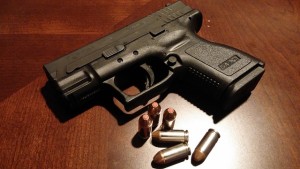 Marijuana grabbed many of the criminal law headlines over the last few state legislative sessions, but this year it has taken a back seat to other pressing issues such as prescription narcotics, heroin and firearms. We recently posted about proposed bills targeting heroin dealers and there has been heated debate about potential laws designed to limit the amount of prescription pain killers a patient may receive. While the fate of these bills remains to be seen, there are also multiple guns bills that have recently appeared on the House and Senate floors in Annapolis.
Marijuana grabbed many of the criminal law headlines over the last few state legislative sessions, but this year it has taken a back seat to other pressing issues such as prescription narcotics, heroin and firearms. We recently posted about proposed bills targeting heroin dealers and there has been heated debate about potential laws designed to limit the amount of prescription pain killers a patient may receive. While the fate of these bills remains to be seen, there are also multiple guns bills that have recently appeared on the House and Senate floors in Annapolis.
The first bill is an attempt to alter a strict state law prohibiting the possession of firearms on public college campuses. As it stands now any person arrested for possessing a handgun at a state university or public school faces a felony charge with a 3-year maximum jail sentence. Possession of a knife or other deadly weapon on school property is a misdemeanor, albeit with the same maximum punishment. The new bill would alter the statute by eliminating the possibility of a felony charge for a person caught possessing a handgun on a college campus. Rather, this offense would become a civil infraction only punishable by a fine of up to $1,000 come this October year if the bill passes. The changes would not apply to gun possession at a public elementary, middle or high school.
A civil citation for possession of a handgun on a public college campus would be handled in the same manner as a citation for offenses such as possession of alcohol by a minor, or using a fake ID. The defendant would be summoned to appear in court, and failure to appear could result in the issuance of a warrant. Failure to pay any fine imposed could result in the defendant being held in criminal contempt of court. Despite these possible sanctions, which can include jail time, this type of citation is not criminal and may not be considered a criminal conviction if the defendant is found guilty. On the other hand, if these citations are not expunged they will be accessible to the public and negative collateral consequences could follow. This is in contrast to the marijuana civil citation statute, which does not permit public access on casesearch and at the courthouse. Defendants would be entitled to have an attorney present at court hearings for these citations, and the prosecutor could elect to place the case on STET or enter a nolle prosequi pursuant to an agreement.
There are three other gun bills making their way through the legislature as well, and the first takes a hardline stance against defendants of domestic violence cases. Maryland law prohibits those convicted of crimes of violence and other disqualifying crimes from possessing firearms, but currently a probation before judgment does not count as a conviction for this purpose. Should Senate Bill 224 pass, a PBJ for a domestic violence crime like second degree assault or violation of a protective order would count as a conviction for the purposes of firearm ownership. Lawmakers in the House have also taken efforts to fine tune the process of obtaining a state wear carry license by reducing the amount of mandatory instruction, and allowing applicants to obtain preliminary approval before investing time and money in the required training.
The Blog will continue to follow these bills, especially Senate Bill 224, which could undermine the entire concept of probation before judgment. Benjamin Herbst is a Maryland domestic violence attorney who handles assault, gun charges and all other criminal cases in state and federal court. Call or email Benjamin anytime for a free consultation.
Resources
Maryland: Multiple Gun-Bills on the Move in the Legislature, nraila.org.
 Criminal Defense Lawyer Blog
Criminal Defense Lawyer Blog

